|
|
|
Sort Order |
|
|
|
Items / Page
|
|
|
|
|
|
|
| Srl | Item |
| 1 |
ID:
074886


|
|
|
|
|
| Publication |
2006.
|
| Summary/Abstract |
Disputes about Czech history are often contestations between different contemporary political projects. Their success or failure has an impact on the Czech national identity. This article shows how the Velvet Revolution of 1989 reinforced the traditional self-perception of Czechs as a cultured, democratic and peaceful nation that can deal with conflicts in a civilized manner. The limitations of this nationalist myth are discussed, as is their impact on current political agendas.
|
|
|
|
|
|
|
|
|
|
|
|
|
|
|
|
| 2 |
ID:
074891
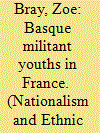

|
|
|
|
|
| Publication |
2006.
|
| Summary/Abstract |
The "ethnonational identity" of young French Basques in France is analyzed in the context of European integration, and compared with the situation in the Spanish Basque Country. Due to the French state's refusal to recognize regional languages, transmission of the Basque language in France is characterized by ethnonationalist values. But these values have shifted recently, from an emphasis on consolidating a Basque nation to practical concerns with grassroots and sustainable development.
|
|
|
|
|
|
|
|
|
|
|
|
|
|
|
|
| 3 |
ID:
074893


|
|
|
|
|
| Publication |
2006.
|
| Summary/Abstract |
English migration into rural Wales presents migrants with unexpected experiences of ethnic and national difference. A study of English migrants in north Wales shows that many adapt by adopting new or alternative definitions of national belonging, including being British, claiming to be "really" Welsh, becoming more "Welsh," or assuming some hyphenated identity. A minority find themselves more conscious of their Englishness, and unable to integrate into a Welsh community.
|
|
|
|
|
|
|
|
|
|
|
|
|
|
|
|
| 4 |
ID:
074888


|
|
|
|
|
| Publication |
2006.
|
| Summary/Abstract |
Identity change in Israel has been an important factor in the changes that enabled the initiation of the peace process in the early 1990s. Identity change was related to new opportunities associated with globalization and a growing desire among middle and upper class Israelis for "normalization" or a lifestyle equivalent to western democracies. This so-called pragmatic perception entailed a cost-benefit view of the territories occupied in 1967 and was carried forward by an empowered business elite that since the mid-1980s sought to liberalize and globalize Israeli society. But this identity change remained at the elite level and alienated significant constituencies. Even among the elite, it had more to do with global opportunities and less with conflict resolution. This instrumental conception of peace was insufficient to sustain the Oslo process.
|
|
|
|
|
|
|
|
|
|
|
|
|
|
|
|
| 5 |
ID:
074889


|
|
|
|
|
| Publication |
2006.
|
| Summary/Abstract |
In the past two decades Mexico has experienced rapid globalization, especially through economic integration with the United States. Mass attitudes have remained proudly Mexican and have become more focused on the nation, at the expense of more local identities. Many Mexicans, especially those more likely to benefit from economic integration, would consider some surrender of sovereignty, while others fear the loss of cultural identity due to the forces of globalization.
|
|
|
|
|
|
|
|
|
|
|
|
|
|
|
|
| 6 |
ID:
074882
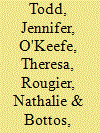

|
|
|
|
|
| Publication |
2006.
|
| Summary/Abstract |
Theories of nationality pose a paradox. Given the possibilities of identity plurality and identity shift, why is ethno-national identity so deeply embedded and so prone to produce conflict? Working with in-depth interviews in Northern Ireland, this article illustrates some typical mechanisms of change in national identity. It shows that plurality of identification is compatible with deeply embedded identities, that change in such identities is possible but costly for individuals, and that change in identity content is more frequent and often more important politically than change in identity category. It shows the greater frequency and ease of change in conflict-intensifying than in conflict-ameliorating directions. Thus it explains the "stickiness" of ethno-national identity and its persistent tendency to produce conflict.
|
|
|
|
|
|
|
|
|
|
|
|
|
|
|
|
| 7 |
ID:
074894


|
|
|
|
|
| Publication |
2006.
|
| Summary/Abstract |
Based on ethnographic fieldwork carried out in 2004/2005, this article explores the construal, change and redefinition of ethno-national identity in Ireland's Eastern border counties. Focusing on the structural properties of generational positions that simultaneously enable and constrain individuals' construal of identity, we analyze changes in the definition of Irishness in relation to recent cultural and political changes on the island.
|
|
|
|
|
|
|
|
|
|
|
|
|
|
|
|
| 8 |
ID:
074884
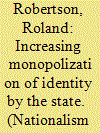

|
|
|
|
|
| Publication |
2006.
|
| Summary/Abstract |
The increasing monopolization by the nation-state of personal identity is a neglected feature of contemporary societies. First, there has occurred a somewhat puzzling conjunction between the activities of the state, on the one hand, and the flourishing of intellectual concern with the issue of identity, on the other. Second, it is a prominent feature of current processes of globalization that nation-states have been squeezed together, constraining them to announce their identities in order to highlight uniqueness. A central focus is upon the authoritarian, probably totalitarian, tendencies in the modern world, in spite of the present emphasis upon global democratization.
|
|
|
|
|
|
|
|
|
|
|
|
|
|
|
|
| 9 |
ID:
074890
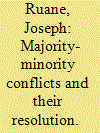

|
|
|
|
|
| Publication |
2006.
|
| Summary/Abstract |
How and under what conditions of political and cultural transformation does long-run majority-minority communal conflict come to an end? What is the role of change in identity, power relations and constructions of community? This article looks at three cases of religious and ethno-religious conflict: Catholic-Protestant relations in France, the Republic of Ireland and the island of Ireland. It employs a systemic theory of communal conflict and a path dependence model of persistence over time. It argues that an end to conflict depends on undoing structural and cultural lock-in, and identifies the way in which this has-or has not-happened in each case.
|
|
|
|
|
|
|
|
|
|
|
|
|
|
|
|
| 10 |
ID:
074892


|
|
|
|
|
| Publication |
2006.
|
| Summary/Abstract |
This article uses a case study of a Pentecostal/charismatic congregation to explore how inclusive, overarching identities are constructed in South Africa. It explores how the congregation's "culture" impacts on identity formation, contestation and change. It argues that the way people construct their identities correlates with their perceived level of empowerment. It concludes that for an overarching identity to become durable, it must be accompanied by structural changes that dismantle the power imbalances embedded in old racial categories.
|
|
|
|
|
|
|
|
|
|
|
|
|
|
|
|
| 11 |
ID:
074883


|
|
|
|
|
| Publication |
2006.
|
| Summary/Abstract |
The Social Map is an attempt to formulate an integrative theoretical model of individual and collective identity processes that draws upon sociological, psychological and biological knowledge in an effort to move towards a more comprehensive understanding of key questions surrounding the construction of experience and identification. This article summarizes the key features of the approach and considers the way in which it might offer a useful perspective on key questions relating to identities, power relations, social cohesion and conflict, including the way in which the bio-psychosocial processes that underlie these social phenomena can be seen to mediate if not structure their expression at the macro level within and across societies.
|
|
|
|
|
|
|
|
|
|
|
|
|
|
|
|
| 12 |
ID:
074887
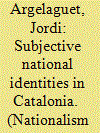

|
|
|
|
|
| Publication |
2006.
|
| Summary/Abstract |
This article relies on socio-demographic surveys to shed light on Subjective National Identity (SNI) in Catalonia, its variation between 1984 and 2001, and the social variables associated with it. While the data shows a close interrelationship between language and national identity, it also shows the increasing impact of the regional government's linguistic policy. Finally, the article explores the interconnection of SNI with the varying stances taken on the national question in Catalonia.
|
|
|
|
|
|
|
|
|
|
|
|
|
|
|
|
| 13 |
ID:
074885
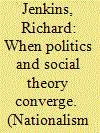

|
|
|
|
|
| Publication |
2006.
|
| Summary/Abstract |
How we conceptualize ethno-national groups is fundamental to understanding changing ethno-national identification and to political debates about identity-based collective rights. This article examines these issues in Northern Ireland, in the context of the Bill of Rights proposed by the 1998 Good Friday Agreement. Rejecting Brubaker's arguments that ethno-national groups are not "real," this article argues that what matters in Northern Ireland is not to weaken ethnic groups and their boundaries, but to change the meaning of identification.
|
|
|
|
|
|
|
|
|
|
|
|
|
|
|
|
|
|
|
|
|